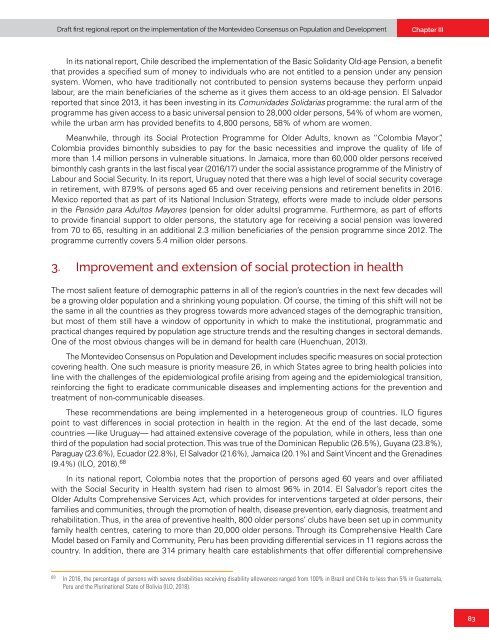Draft first regional report on the implementation of the Montevideo Consensus on Population and Development
This draft report seeks to give an account of progress in the implementation of the priority measures of the Montevideo Consensus on Population and Development in the region, as well as the differences between countries in terms of the degree of implementation. By highlighting relevant national experiences, it also seeks to facilitate the exchange of good practices among countries so that they can benefit from each other in their efforts to advance the implementation of the actions of the Montevideo Consensus.
This draft report seeks to give an account of progress in the implementation of the priority measures of the Montevideo Consensus on Population and Development in the region, as well as the differences between countries in terms of the degree of implementation. By highlighting relevant national experiences, it also seeks to facilitate the exchange of good practices among countries so that they can benefit from each other in their efforts to advance the implementation of the actions of the Montevideo Consensus.
Create successful ePaper yourself
Turn your PDF publications into a flip-book with our unique Google optimized e-Paper software.
<str<strong>on</strong>g>Draft</str<strong>on</strong>g> <str<strong>on</strong>g>first</str<strong>on</strong>g> <str<strong>on</strong>g>regi<strong>on</strong>al</str<strong>on</strong>g> <str<strong>on</strong>g>report</str<strong>on</strong>g> <strong>on</strong> <strong>the</strong> implementati<strong>on</strong> <strong>of</strong> <strong>the</strong> M<strong>on</strong>tevideo C<strong>on</strong>sensus <strong>on</strong> Populati<strong>on</strong> <strong>and</strong> <strong>Development</strong><br />
Chapter III<br />
In its nati<strong>on</strong>al <str<strong>on</strong>g>report</str<strong>on</strong>g>, Chile described <strong>the</strong> implementati<strong>on</strong> <strong>of</strong> <strong>the</strong> Basic Solidarity Old-age Pensi<strong>on</strong>, a benefit<br />
that provides a specified sum <strong>of</strong> m<strong>on</strong>ey to individuals who are not entitled to a pensi<strong>on</strong> under any pensi<strong>on</strong><br />
system. Women, who have traditi<strong>on</strong>ally not c<strong>on</strong>tributed to pensi<strong>on</strong> systems because <strong>the</strong>y perform unpaid<br />
labour, are <strong>the</strong> main beneficiaries <strong>of</strong> <strong>the</strong> scheme as it gives <strong>the</strong>m access to an old-age pensi<strong>on</strong>. El Salvador<br />
<str<strong>on</strong>g>report</str<strong>on</strong>g>ed that since 2013, it has been investing in its Comunidades Solidarias programme: <strong>the</strong> rural arm <strong>of</strong> <strong>the</strong><br />
programme has given access to a basic universal pensi<strong>on</strong> to 28,000 older pers<strong>on</strong>s, 54% <strong>of</strong> whom are women,<br />
while <strong>the</strong> urban arm has provided benefits to 4,800 pers<strong>on</strong>s, 58% <strong>of</strong> whom are women.<br />
Meanwhile, through its Social Protecti<strong>on</strong> Programme for Older Adults, known as “Colombia Mayor”,<br />
Colombia provides bim<strong>on</strong>thly subsidies to pay for <strong>the</strong> basic necessities <strong>and</strong> improve <strong>the</strong> quality <strong>of</strong> life <strong>of</strong><br />
more than 1.4 milli<strong>on</strong> pers<strong>on</strong>s in vulnerable situati<strong>on</strong>s. In Jamaica, more than 60,000 older pers<strong>on</strong>s received<br />
bim<strong>on</strong>thly cash grants in <strong>the</strong> last fiscal year (2016/17) under <strong>the</strong> social assistance programme <strong>of</strong> <strong>the</strong> Ministry <strong>of</strong><br />
Labour <strong>and</strong> Social Security. In its <str<strong>on</strong>g>report</str<strong>on</strong>g>, Uruguay noted that <strong>the</strong>re was a high level <strong>of</strong> social security coverage<br />
in retirement, with 87.9% <strong>of</strong> pers<strong>on</strong>s aged 65 <strong>and</strong> over receiving pensi<strong>on</strong>s <strong>and</strong> retirement benefits in 2016.<br />
Mexico <str<strong>on</strong>g>report</str<strong>on</strong>g>ed that as part <strong>of</strong> its Nati<strong>on</strong>al Inclusi<strong>on</strong> Strategy, efforts were made to include older pers<strong>on</strong>s<br />
in <strong>the</strong> Pensión para Adultos Mayores (pensi<strong>on</strong> for older adults) programme. Fur<strong>the</strong>rmore, as part <strong>of</strong> efforts<br />
to provide financial support to older pers<strong>on</strong>s, <strong>the</strong> statutory age for receiving a social pensi<strong>on</strong> was lowered<br />
from 70 to 65, resulting in an additi<strong>on</strong>al 2.3 milli<strong>on</strong> beneficiaries <strong>of</strong> <strong>the</strong> pensi<strong>on</strong> programme since 2012. The<br />
programme currently covers 5.4 milli<strong>on</strong> older pers<strong>on</strong>s.<br />
3. Improvement <strong>and</strong> extensi<strong>on</strong> <strong>of</strong> social protecti<strong>on</strong> in health<br />
The most salient feature <strong>of</strong> demographic patterns in all <strong>of</strong> <strong>the</strong> regi<strong>on</strong>’s countries in <strong>the</strong> next few decades will<br />
be a growing older populati<strong>on</strong> <strong>and</strong> a shrinking young populati<strong>on</strong>. Of course, <strong>the</strong> timing <strong>of</strong> this shift will not be<br />
<strong>the</strong> same in all <strong>the</strong> countries as <strong>the</strong>y progress towards more advanced stages <strong>of</strong> <strong>the</strong> demographic transiti<strong>on</strong>,<br />
but most <strong>of</strong> <strong>the</strong>m still have a window <strong>of</strong> opportunity in which to make <strong>the</strong> instituti<strong>on</strong>al, programmatic <strong>and</strong><br />
practical changes required by populati<strong>on</strong> age structure trends <strong>and</strong> <strong>the</strong> resulting changes in sectoral dem<strong>and</strong>s.<br />
One <strong>of</strong> <strong>the</strong> most obvious changes will be in dem<strong>and</strong> for health care (Huenchuan, 2013).<br />
The M<strong>on</strong>tevideo C<strong>on</strong>sensus <strong>on</strong> Populati<strong>on</strong> <strong>and</strong> <strong>Development</strong> includes specific measures <strong>on</strong> social protecti<strong>on</strong><br />
covering health. One such measure is priority measure 26, in which States agree to bring health policies into<br />
line with <strong>the</strong> challenges <strong>of</strong> <strong>the</strong> epidemiological pr<strong>of</strong>ile arising from ageing <strong>and</strong> <strong>the</strong> epidemiological transiti<strong>on</strong>,<br />
reinforcing <strong>the</strong> fight to eradicate communicable diseases <strong>and</strong> implementing acti<strong>on</strong>s for <strong>the</strong> preventi<strong>on</strong> <strong>and</strong><br />
treatment <strong>of</strong> n<strong>on</strong>-communicable diseases.<br />
These recommendati<strong>on</strong>s are being implemented in a heterogeneous group <strong>of</strong> countries. ILO figures<br />
point to vast differences in social protecti<strong>on</strong> in health in <strong>the</strong> regi<strong>on</strong>. At <strong>the</strong> end <strong>of</strong> <strong>the</strong> last decade, some<br />
countries —like Uruguay— had attained extensive coverage <strong>of</strong> <strong>the</strong> populati<strong>on</strong>, while in o<strong>the</strong>rs, less than <strong>on</strong>e<br />
third <strong>of</strong> <strong>the</strong> populati<strong>on</strong> had social protecti<strong>on</strong>. This was true <strong>of</strong> <strong>the</strong> Dominican Republic (26.5%), Guyana (23.8%),<br />
Paraguay (23.6%), Ecuador (22.8%), El Salvador (21.6%), Jamaica (20.1%) <strong>and</strong> Saint Vincent <strong>and</strong> <strong>the</strong> Grenadines<br />
(9.4%) (ILO, 2018). 68<br />
In its nati<strong>on</strong>al <str<strong>on</strong>g>report</str<strong>on</strong>g>, Colombia notes that <strong>the</strong> proporti<strong>on</strong> <strong>of</strong> pers<strong>on</strong>s aged 60 years <strong>and</strong> over affiliated<br />
with <strong>the</strong> Social Security in Health system had risen to almost 96% in 2014. El Salvador’s <str<strong>on</strong>g>report</str<strong>on</strong>g> cites <strong>the</strong><br />
Older Adults Comprehensive Services Act, which provides for interventi<strong>on</strong>s targeted at older pers<strong>on</strong>s, <strong>the</strong>ir<br />
families <strong>and</strong> communities, through <strong>the</strong> promoti<strong>on</strong> <strong>of</strong> health, disease preventi<strong>on</strong>, early diagnosis, treatment <strong>and</strong><br />
rehabilitati<strong>on</strong>. Thus, in <strong>the</strong> area <strong>of</strong> preventive health, 800 older pers<strong>on</strong>s’ clubs have been set up in community<br />
family health centres, catering to more than 20,000 older pers<strong>on</strong>s. Through its Comprehensive Health Care<br />
Model based <strong>on</strong> Family <strong>and</strong> Community, Peru has been providing differential services in 11 regi<strong>on</strong>s across <strong>the</strong><br />
country. In additi<strong>on</strong>, <strong>the</strong>re are 314 primary health care establishments that <strong>of</strong>fer differential comprehensive<br />
68<br />
In 2016, <strong>the</strong> percentage <strong>of</strong> pers<strong>on</strong>s with severe disabilities receiving disability allowances ranged from 100% in Brazil <strong>and</strong> Chile to less than 5% in Guatemala,<br />
Peru <strong>and</strong> <strong>the</strong> Plurinati<strong>on</strong>al State <strong>of</strong> Bolivia (ILO, 2018).<br />
83


















